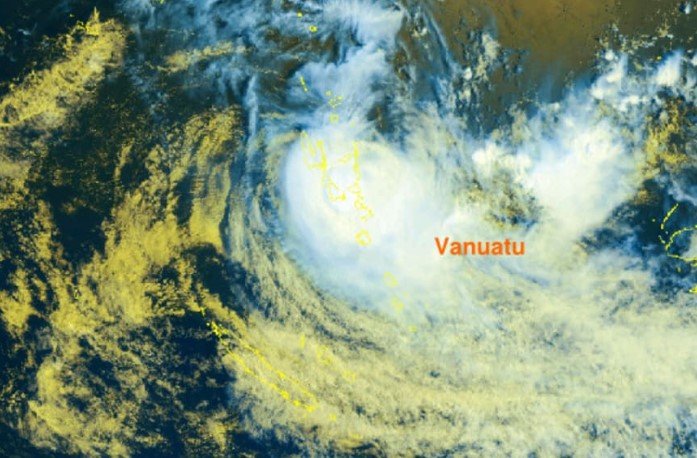Tropical cyclone Lola, the strongest storm to hit Vanuatu this year, has made landfall on the northern islands of the Pacific nation, causing widespread damage and displacement. The storm, which reached category 5 intensity on Tuesday, brought winds of up to 320 km/h, heavy rain, and storm surges to the provinces of Torba, Sanma, Penama, and Malampa. According to the Vanuatu Meteorology and Geo-hazards Department, Lola passed over Pentecost Island and Malekula Island on Wednesday morning, before weakening to a category 3 cyclone as it moved southwestward.
The cyclone has cut off communications with the Penama province since Tuesday night, making it difficult to assess the full extent of the impact. Vanuatu Prime Minister Charlot Salwai told RNZ that on-site teams would be reporting back on conditions today. He said that many people still had unrepaired homes from the previous cyclones that hit the country earlier this year, and that schools were operating as temporary shelters. He also expressed concern about the food security situation, as the cyclone damaged crops and livestock.

Government declares state of emergency, appeals for international aid
The Vanuatu government has declared a state of emergency for the affected provinces and activated its National Disaster Management Office (NDMO) to coordinate the response. The NDMO has deployed rapid assessment teams to the affected areas and is working with humanitarian partners to provide relief supplies and services. The NDMO has also issued a red alert for the capital, Port Vila, and a blue alert for Tafea province, advising people to stay indoors and avoid unnecessary travel.
The government has also appealed for international assistance, as it faces multiple challenges in responding to the disaster. Vanuatu is still recovering from the economic and social impacts of the COVID-19 pandemic, which has affected its tourism sector and health system. The country is also dealing with the ongoing volcanic eruption on Tanna island, which has displaced thousands of people and disrupted livelihoods. In addition, Vanuatu is one of the most vulnerable countries to climate change, which has increased the frequency and intensity of extreme weather events.
Regional and global support pledged for Vanuatu
Several regional and global actors have pledged their support for Vanuatu in the aftermath of cyclone Lola. The Pacific Islands Forum Secretariat (PIFS) issued a statement expressing its solidarity with Vanuatu and offering its assistance. The PIFS said it was ready to mobilize its Pacific Resilience Facility, which provides financing for disaster recovery and resilience building in the region.
The Australian government announced that it would provide A$3 million in humanitarian assistance to Vanuatu, including emergency shelter kits, hygiene items, water purification tablets, and solar lanterns. The Australian Defence Force also deployed a C-17A Globemaster aircraft to deliver relief supplies and personnel to Port Vila. Australia’s Foreign Minister Marise Payne said that Australia stood with its Pacific family in times of crisis.
The United Nations also expressed its readiness to support Vanuatu in its response and recovery efforts. The UN Resident Coordinator for Vanuatu, Sanaka Samarasinha, said that the UN was working closely with the government and humanitarian partners to assess the needs and deliver assistance. He said that the UN had pre-positioned relief items in strategic locations across the country and was mobilizing additional resources from its Central Emergency Response Fund.






